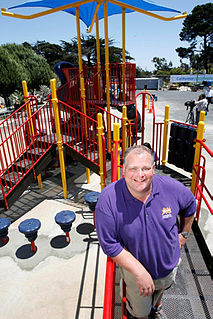Top 42 Quotes & Sayings by Darell Hammond
Explore popular quotes and sayings by an American businessman Darell Hammond.
Last updated on April 14, 2025.
I was raised in a group home for 14 years, so I was a beneficiary of philanthropy. I didn't have a family. The nameless, faceless strangers were my family. They gave me an education, put food on the table and clothes on my back. I am who I am because of that formative experience. Now I am paying it forward.
Sendak's 1963 classic 'Where The Wild Things Are' has long been a favorite of mine because of the creative imagery, fantastic adventures and, most of all, because of how this timeless story shows us that children need to be free to roam, explore and invent in order to understand their place in the world that surrounds them.
Growing up in a group home, and with an undiagnosed learning disability to boot, the odds of success were not on my side. But when I joined the high school football team, I learned the value of discipline, focus, persistence, and teamwork - all skills that have proven vital to my career as a C.E.O. and social entrepreneur.
We all have a natural instinct to protect children from harm. It's never fun to see a child hurt, even if it's just a scraped knee. But on the other hand, children need to take on physical challenges to learn and grow, and scraped knees and other bumps and bruises teach them valuable lessons about their own limits.
We are raising today's children in sterile, risk-averse and highly structured environments. In so doing, we are failing to cultivate artists, pioneers and entrepreneurs, and instead cultivating a generation of children who can follow the rules in organized sports games, sit for hours in front of screens and mark bubbles on standardized tests.
Our education system is increasingly embracing a black-and-white way of thinking, in which 'learning' and 'play' are diametrically opposed. 'Learning' is the serious stuff that happens inside a classroom and can be measured via multiple choice questions and a No. 2 pencil. 'Play' is frivolous, fun, and worst of all, optional.



















